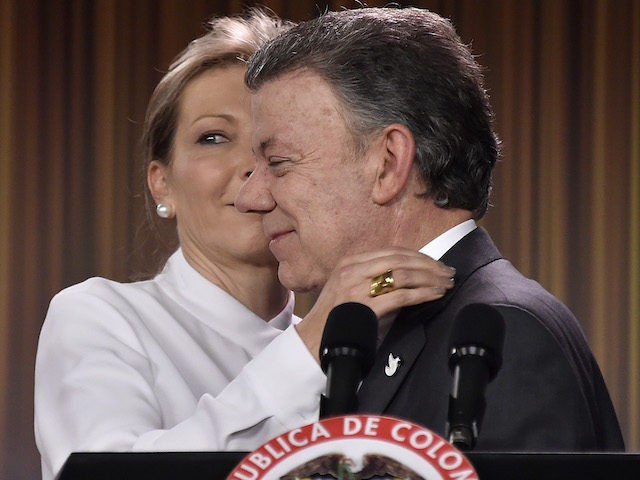On the eve of the announcement of this year’s Nobel Peace Prize, various experts and committee members predicted a Peace Prize for Colombia’s president, Juan Manuel Santos, was “out of the question” thanks to the Colombian people rejecting an amnesty deal for the FARC.
Historian Asle Sveen used the above quoted phrase. “Colombia’s off any credible list,” Kristian Berg Harpviken, the head of the Nobel Peace Research Institute, said.
On Friday morning, the Norwegian Nobel Committee announced Juan Manuel Santos as this year’s winner. The committee said in their announcement Santos deserved the award for “his resolute efforts to bring the country’s more than 50-year-long civil war to an end, a war that has cost the lives of at least 220,000 Colombians and displaced close to six million people.” The committee notes that the award is as much for the Colombian people – who have endured a half century of being terrorized by the Marxist Revolutionary Armed Forces of Colombia (FARC) – as for Santos himself, and explicitly does not reward the other half of the peace negotiations, FARC terrorist leader “Timochenko” and his chief negotiators.
The announcement also addresses the fact that the Colombian people rejected the peace deal – one that would have allowed most FARC terrorists to avoid prison sentences and FARC leaders to establish a political party, possibly funded with drug trafficking profits.
“The fact that a majority of the voters said no to the peace accord does not necessarily mean that the peace process is dead. The referendum was not a vote for or against peace,” the committee said, encouraging further negotiations between the FARC and the representatives of their victims:
By awarding this year’s Peace Prize to President Juan Manuel Santos, the Norwegian Nobel Committee wishes to encourage all those who are striving to achieve peace, reconciliation and justice in Colombia. The president himself has made it clear that he will continue to work for peace right up until his very last day in office. The Committee hopes that the Peace Prize will give him strength to succeed in this demanding task.
Santos accepted the award in a speech this morning “in the name of all Colombians, especially the victims of this conflict we have suffered for 50 years.” The award, he said, would be an impetus to “begin to construct a stable and durable peace… so that there will not be a single new victim, a single new death.”
With a less than one percent difference, the Colombian people voted “no” to the peace deal Santos brokered with Timochenko, signed in Havana, where the communist Cuban government has provided safe haven to FARC terrorists for years. The deal would have given all FARC terrorists 90 days to disarm and hand themselves over to a special tribunal, staffed partially by FARC terrorists, which would have judged the crimes of all terrorists individually. Crimes would have been divided into two categories: “political crimes” and “crimes against humanity.” Only those found guilty of the latter would have served prison sentences, and the categories were never specifically defined. FARC terrorists would also be granted representation in the nation’s Congress without being elected until 2018, when they could run their own candidates for office.
The opposition to the deal, led by former president (and now Senator) Álvaro Uribe, argued that the deal was too lenient with terrorists that had plagued the countryside for decades and were heavily involved in the drug trade. On Univisión, another former president, Andrés Pastrana, compared the deal to allowing Mexico’s Sinaloa Cartel to establish a political party and granting Joaquín “El Chapo” Guzmán the same legitimacy as a head of state. Pastrana noted to host Jorge Ramos that he had been personally abducted by the FARC and had lost his father-in-law in a FARC kidnapping, and that his frustration with the deal was that of many FARC victims.
The distribution of votes appears to support Pastrana: “no” won the mountainous interior of the country, with “yes” taking the coastal and urban areas that had suffered the FARC’s reign of terror less directly. The deal lost in the village that saw the FARC born over 50 years ago and in FARC leader Timochenko’s hometown.
Uribe, who Santos has invited to the dialogue to construct a new peace deal, congratulated his former Defense Minister this morning:
Felicito el Nobel para el Presidente Santos, deseo que conduzca a cambiar acuerdos dañinos para la democracia
— Álvaro Uribe Vélez (@AlvaroUribeVel) October 7, 2016
“I congratulate President Santos on the Nobel, I hope he will work to change agreements that hurt democracy,” he tweeted.
The FARC have rejected the referendum, calling it “not legally viable” as both Santos and Timochenko signed the agreement. The Colombian Constitution mandates the approval of the people for such an agreement to be valid, however; Uribe and his supporters argue that Timochenko’s proposal to ignore the referendum entirely would be unconstitutional.
The ceasefire between the FARC and the Colombian government will end on October 31 unless the parties sign a new peace deal.

COMMENTS
Please let us know if you're having issues with commenting.